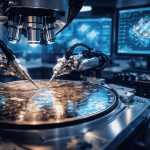
The Evolution of HPC Hardware: From CPUs to GPUs and Beyond
Why HPC Hardware Evolution Matters
HPC hardware evolution plays a critical role in modern science, healthcare, weather forecasting, and artificial intelligence. With more data being processed every second, having faster and more efficient systems is vital. In this article, we’ll break down the shifts from CPUs to GPUs and emerging hardware trends.
A Brief History of HPC Hardware Evolution
In the early days, supercomputers relied solely on Central Processing Units (CPUs). These processors did everything, but they had limitations.
Key Points:
-
CPUs are designed for general tasks.
-
They are powerful but not efficient for parallel processing.
-
The first real supercomputers used vector processors, which improved speed but were still CPU-based.
This changed as demand grew for faster and more specialized systems.
Rise of GPUs in HPC Hardware Evolution
Next came Graphics Processing Units (GPUs). While originally for gaming, GPUs excel at handling many tasks at once.
Why GPUs Changed the Game:
-
They allow parallel processing.
-
They reduce time for simulations and data analysis.
-
NVIDIA and AMD led the way in GPU adoption for HPC.
This shift marked a new phase in Hardware for HPC, helping industries solve bigger problems faster.
Accelerators and AI Chips in HPC Hardware Evolution
Finally, custom accelerators like TPUs (Tensor Processing Units) and FPGAs (Field-Programmable Gate Arrays) entered the HPC scene.
Benefits of Accelerators:
-
Faster than both CPUs and GPUs for specific tasks.
-
Lower power usage.
-
Ideal for AI, ML, and big data.
Many HPC systems now use hybrid models that combine CPUs, GPUs, and AI chips. This allows them to work faster and smarter.
Future Trends in Hardware for HPC
Looking ahead, the landscape is evolving fast. More research is focused on energy-efficient hardware and quantum computing.
What’s Coming:
-
Quantum processors that solve problems traditional hardware can’t.
-
Neuromorphic chips mimicking the human brain for advanced learning tasks.
-
Better cooling and lower energy use for greener HPC systems.
As this Hardware for HPC continues, we’ll see even more breakthroughs.
Real-World Impact of HPC Hardware Evolution
Many fields now rely on advanced HPC systems to solve real problems.
Examples:
-
Healthcare: Drug discovery and genomics.
-
Climate Science: Accurate models for weather and natural disasters.
-
Finance: Risk modeling and fraud detection.
Check out how Oak Ridge National Laboratory and Lawrence Livermore National Laboratory are using these systems today.
How Businesses Can Adapt to HPC Hardware Evolution
For companies, upgrading HPC infrastructure is not just optional—it’s necessary.
Tips for Businesses:
-
Start with hybrid architectures.
-
Train teams on GPU and AI acceleration.
-
Monitor system performance regularly.
Also, explore OpenHPC to access tools and support for building and managing HPC environments.
FAQs
What is the biggest change in HPC hardware evolution?
The shift from CPU-only systems to GPU-based and hybrid models.
How does GPU speed up HPC tasks?
GPUs handle many operations at once, making them ideal for data-heavy work.
Will quantum computing replace traditional HPC?
Not soon. It will enhance HPC for certain tasks but won’t replace current systems entirely.
The Road Ahead for HPC Hardware Evolution
Hardware for HPC isn’t just a tech trend—it’s a driving force behind real-world progress. From simple CPUs to hybrid systems and quantum computing, every leap forward opens new possibilities. Whether you’re in research, business, or IT, staying updated is key.
Visit our HPC and AI for more details.
Author Profile
- Hey there! I am a Media and Public Relations Strategist at NeticSpace | passionate journalist, blogger, and SEO expert.
Latest entries
 MLOpsDecember 22, 2025Serverless MLOps Pipelines: A Practical Cloud Guide
MLOpsDecember 22, 2025Serverless MLOps Pipelines: A Practical Cloud Guide Data AnalyticsDecember 20, 2025Dark Mode Dashboards: Do They Improve Readability?
Data AnalyticsDecember 20, 2025Dark Mode Dashboards: Do They Improve Readability? Computer Aided-EngineeringDecember 19, 2025How CAE in Semiconductors Shapes Modern Chip Design
Computer Aided-EngineeringDecember 19, 2025How CAE in Semiconductors Shapes Modern Chip Design AI WorkflowsDecember 17, 2025Gemini 3 Flash Model: Build Faster, Smarter AI Apps
AI WorkflowsDecember 17, 2025Gemini 3 Flash Model: Build Faster, Smarter AI Apps

